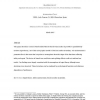Free Online Productivity Tools
i2Speak
i2Symbol
i2OCR
iTex2Img
iWeb2Print
iWeb2Shot
i2Type
iPdf2Split
iPdf2Merge
i2Bopomofo
i2Arabic
i2Style
i2Image
i2PDF
iLatex2Rtf
Sci2ools
MANSCI
2010
2010
A Quantitative Measurement of Regret Theory
This paper introduces a choice-based method that for the first time makes it possible to quantitatively measure regret theory, one of the most popular models of decision under uncertainty. Our measurement is parameter-free in the sense that it requires no assumptions about the shape of the functions reflecting utility and regret. The choice of stimuli was such that event-splitting effects could not confound our results. Our findings were largely consistent with the assumptions of regret theory although some deviations were observed. These deviations can be explained by psychological heuristics and referencedependence of preferences.
Related Content
| Added | 29 Jan 2011 |
| Updated | 29 Jan 2011 |
| Type | Journal |
| Year | 2010 |
| Where | MANSCI |
| Authors | Han Bleichrodt, Alessandra Cillo, Enrico Diecidue |
Comments (0)

